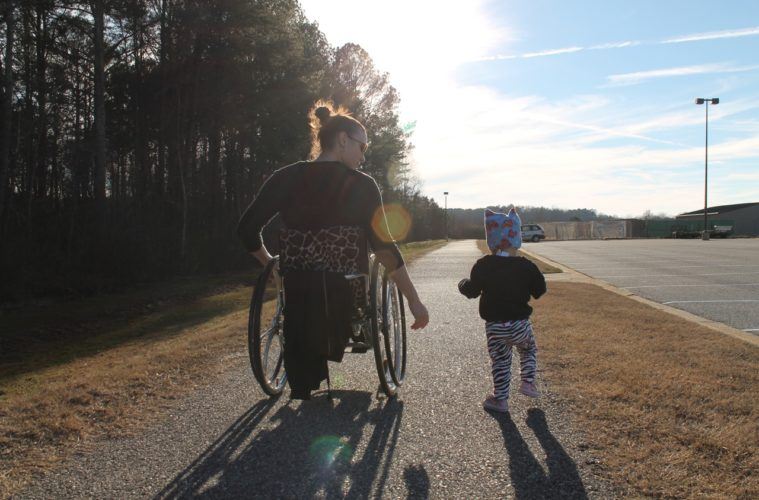 Wheelchair User and Mom Kristina Rhoades Shares Parenting Advice below for New Parents on Wheels.
Wheelchair User and Mom Kristina Rhoades Shares Parenting Advice below for New Parents on Wheels.
Kristina is the proud mom to 5-year-old Kamryn and wife to her childhood best friend, Jacob. She is a long-time wheelchair user with a spinal cord injury and a national disability spokesperson and advocate. She lives with her family in New Mexico and works freelance as a consultant, writer and life coach. Kristina is also a Cure Medical advocate.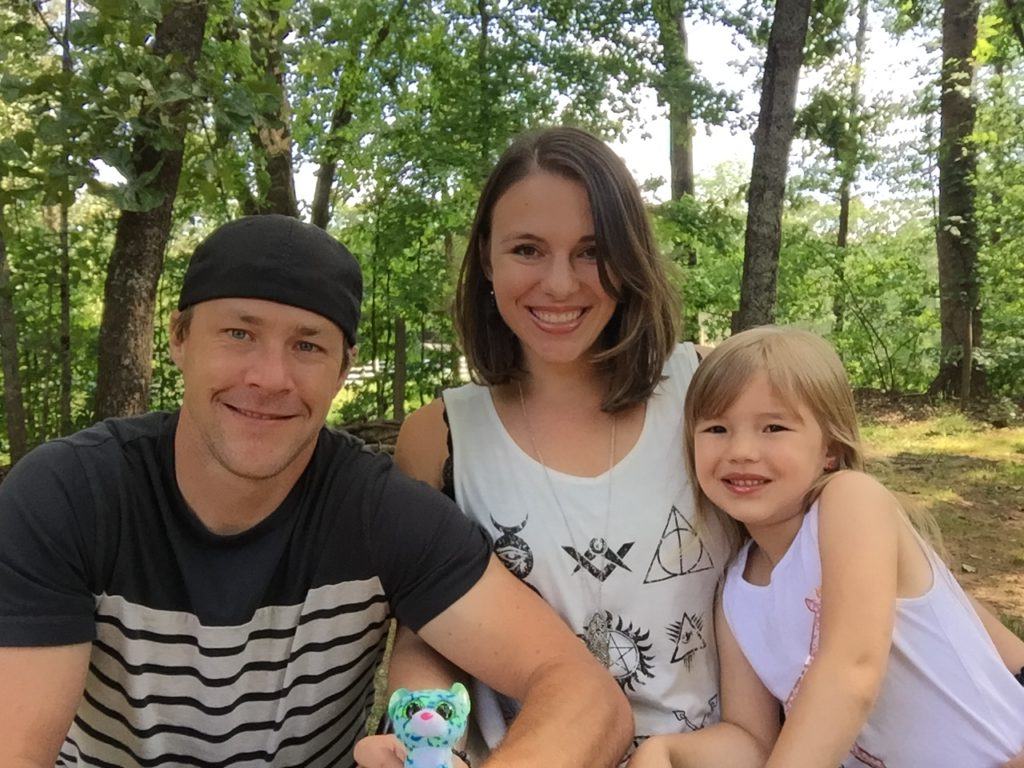 Being a parent is a wonderful thing. It’s arguably one of the most rewarding, unpredictable, exciting, meaningful and challenging jobs of a person’s lifetime. Giving life and being responsible for another human being often evolves us into better versions of ourselves. We suddenly see things differently – through their eyes and with their future in mind.
Being a parent is a wonderful thing. It’s arguably one of the most rewarding, unpredictable, exciting, meaningful and challenging jobs of a person’s lifetime. Giving life and being responsible for another human being often evolves us into better versions of ourselves. We suddenly see things differently – through their eyes and with their future in mind.
As magical as parenting is, raising a tiny newborn into an independent adult is no easy task. In fact, it’s pretty much on the job training – especially with a first child.
These days, there are plenty of books, websites and apps that can offer some pretty helpful tips and advice for moms and dads alike, covering every parenting topic from breastfeeding to potty training to communicating with teenagers. However, at the end of the day, it’s up to the parents to figure it all out.
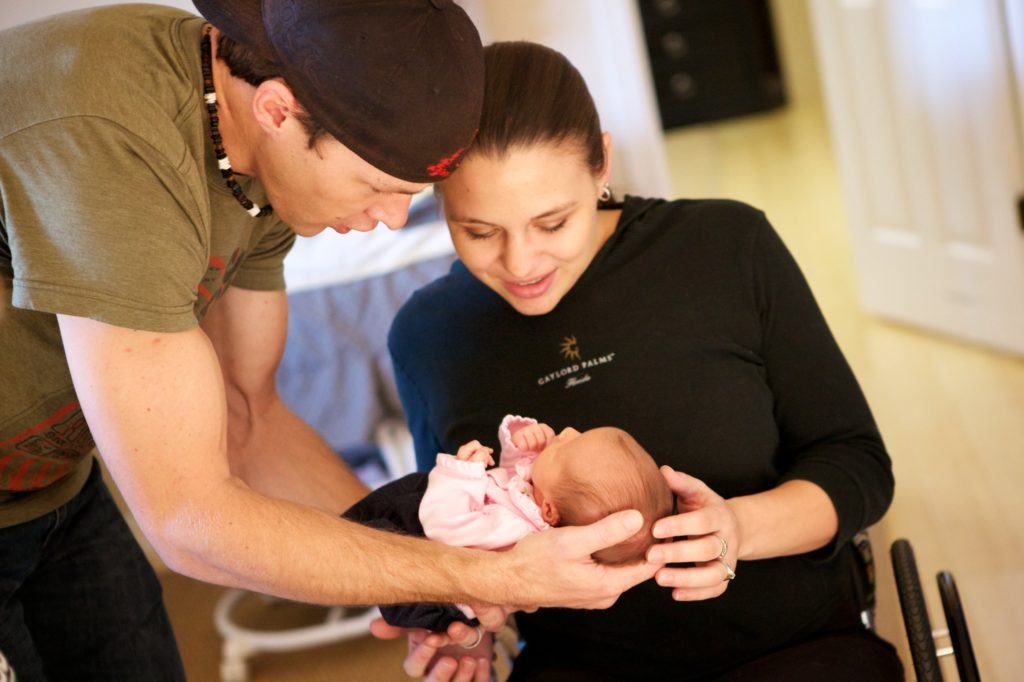
Many parents take cues from what they’ve experienced or observed. People often parent like their parents and also pick up parenting habits from friends and family they admire.
If you’re a parent who uses a wheelchair, you may not have a lot of examples in your life to learn from because you may not know another parent in the same situation. But, have no fear – they’re out there and they’re thriving while raising families.
For the sake of this post, we’re going to stick to parenting tips for younger children, simply because the older the children get, the more likely you’ve already figured things out on your own. At the beginning, though, things can be a little scary and overwhelming trying to figure it all out.
1. Keep a Scarf Handy
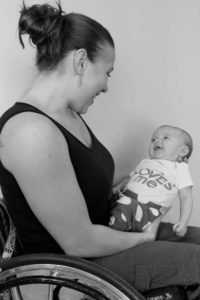 If you use a wheelchair, you’re probably accustomed to being a critical thinker in order to accomplish basic tasks. In fact, you probably have “reachers” or “grabbers” laying around your house to help you get things off the top shelves and be independent in your home. When you have a baby, it’s no different.
If you use a wheelchair, you’re probably accustomed to being a critical thinker in order to accomplish basic tasks. In fact, you probably have “reachers” or “grabbers” laying around your house to help you get things off the top shelves and be independent in your home. When you have a baby, it’s no different.
Scarfs or other long pieces of strong materials are going to be your best friend for the first year or so – just make sure it’s soft and slobber-proof.
They can be used to keep your baby secured in your lap when they are too young to sit up on their own, and then also when they’re older and more squirmy. A scarf is also great for getting your baby off the ground when they’re young. Simply wrap it around your baby’s chest when they’re on the ground and, with your strongest arm, grab the two ends so it’s snug and lift them into your lap!
2. Find Equipment That Supports Your Needs
For parents with limited mobility, we have a lot to consider when shopping for basic baby equipment. It goes beyond the cutest color or what’s on sale; we need to find the stuff that makes us most independent as parents.
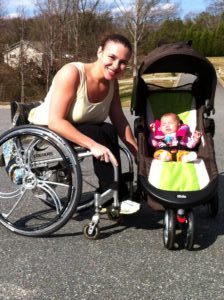 Be prepared do plenty of research. Sometimes buying online is not the best option, because you actually need to go try things out in person to see if it will work for you.
Be prepared do plenty of research. Sometimes buying online is not the best option, because you actually need to go try things out in person to see if it will work for you.
For example, many parents in chairs love car seats that swivel all the way around so they can easily flip a baby from the rear facing position to get them in and out of the seat.
Strollers that have a single bar connecting the handles are often easier that those with two separate handles because wheelchair users can put one hand in the center to push the stroller in a straight line while pushing their chair with the other hand (just like a shopping cart).
Cribs and changing tables can also be built from scratch or modified to be lower for easy access from a seated position.
VIDEO: KRISTINA LOVES THE CURE TWIST WHILE SHE’S ON THE GO
 Kristina loves the Twist because it’s easy to use, small for her bag or purse and isn’t obvious to people when they see it. To request free samples of the Cure Twist® Ready-to-Use Catheter or any Cure Medical catheter, contact your local distributor of quality healthcare products, or click here.
Kristina loves the Twist because it’s easy to use, small for her bag or purse and isn’t obvious to people when they see it. To request free samples of the Cure Twist® Ready-to-Use Catheter or any Cure Medical catheter, contact your local distributor of quality healthcare products, or click here.
3. Be Flexible, But Be Firm on Safety
When you start out as a parent, you may have a lot of rules in mind that you’ll find aren’t as important to enforce as you may have thought. You’ll learn to pick your battles and loosen up on the stuff that doesn’t really make a difference in the end.
However, there are some instances where you’ll have to “stand your ground” because it’s about safety.
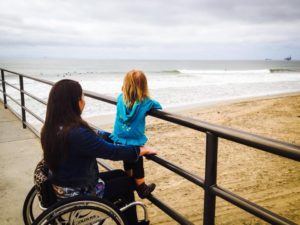 As a parent in a chair, it may be more difficult to chase your child if they run into a street or run away from you in a crowd.
As a parent in a chair, it may be more difficult to chase your child if they run into a street or run away from you in a crowd.
That’s why when these types of behaviors pop up, it’s important to be clear with your child that you mean business.
Sometimes that means leaving an event with a unhappy, crying kid to prove a point or you using a more stern voice than usual to get their full attention. Your kids understand much more than you realize, so try reasoning with them, as well, and explain how some things are more challenging for a parent in a wheelchair and that you have to be a team to keep everyone safe.
4. Do What Works Best For Your Family, Not Others
Being a parent comes with a lot of pressure from others to do things the “right” way. You’ll hear all sorts of opinions about when and where your baby should sleep, how long to breastfeed, how much screen time is appropriate and how your child should act.
It can drive a person crazy trying to be the “perfect parent” by pleasing everyone and trying to meet their expectations.
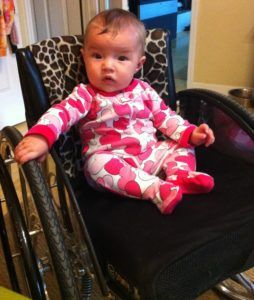
The reality is this – no one knows what is best for you and your family except YOU.
Because of limited mobility, you may choose to have your baby’s crib in your room and even co-sleep when they’re older – which you’re sure to get flack about.
You may, at times, need to change your baby or nurse them in a more public space because the changing table is inaccessible – and you might get a look or two.
Maybe you’ll have find you have different rules for your kid than most kids – such as staying an arms’ length away from an adult when crossing the street, versus the common hand-holding routine (as, that can make it difficult to push a wheelchair).
The bottom line is it’s that it’s your job to be confident in the choices you make as a parent because you know what’s best for you and yours.
5. Know That You’re Doing a Good Job
Every parent wonders if they’re doing things right, if they’re raising healthy humans and if they have what it takes to get it all done. A parent with a disability feels that pressure even more so, because we fear there are crucial parts to parenting that we literally cannot do – and we worry that it’s having negative impacts on our children.
Well, here’s what you mustn’t forget. You are worthy.
If you are trying your best and loving your baby with all you have, you are giving them everything they need. Plus, the character and perspectives that are being fostered in our children by being raised by parents that offer such a unique and diverse life experience is invaluable. They will grow up with an understanding, compassion and willingness to help others that this world so badly needs.
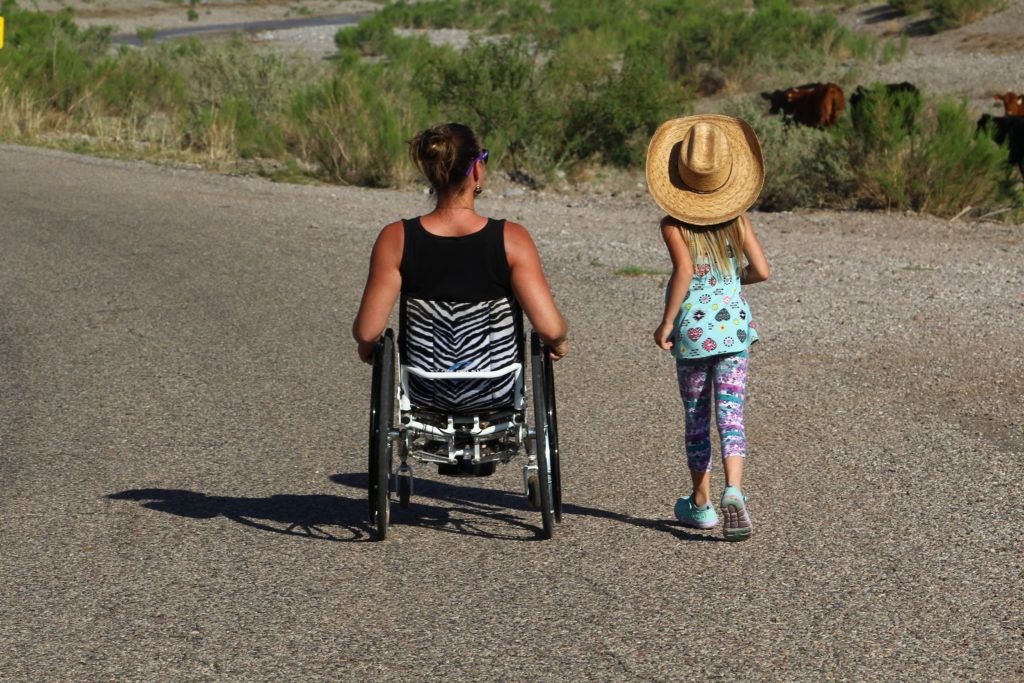
6. Don’t Be Afraid to Ask For Help
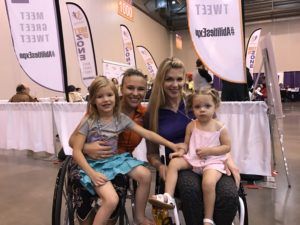
Parenting can be easier and special bonds can be made when you seek out others that are in the same situation as you.
In closing, it’s important to remember that we all need a little help sometimes. Whether it’s from your partner, family, friends, hired help or even finding ways for your kiddo to help out – just don’t try to do it all on your own.
There are also some great groups on Facebook for parents in wheelchairs, like this one, where you can find helpful advice and community support. Just reach out and people will be willing to help. It’s important to always take good care of yourself, so that you can care for others.
The old saying couldn’t be more true, “It takes a village!”
Did you know Cure Medical makes a Hydrophilic catheter designed specifically for kids? It’s not made with harmful chemicals like DEhp or bpa, and it’s easy to use. Learn more here.
Enjoy Our Free Resources & Articles
 CURE NATION is designed with you in mind, to offer assistance and education when you need it through a personal support program.
CURE NATION is designed with you in mind, to offer assistance and education when you need it through a personal support program.
All of the information you find below and on our related social media pages is meant to guide you to places, topics and, resources that enhance your life, while also connecting you with a growing group of friends.
- Sign up for our free, CURE NATION e-newsletter to have our latest stories delivered directly to you, once a month.
- Get our FREE LIFESTYLE + TRAVEL BOOKS here.
- Have an idea you’d like to share? Let us know.
- Be sure to take a minute to meet our Cure Advocates too.
You may also enjoy:

